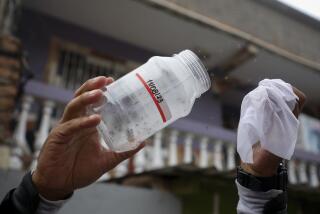Malaria missteps
- Share via
ANYBODY WITH A SERIOUS ILLNESS would rather see a doctor than a banker. So why does the World Bank still think it knows best about how to eradicate disease in the Third World? Its expertise lies in lending money for big infrastructure projects, not in public health -- nor in lending money for public health.
A paper published this week in the British medical journal the Lancet thoroughly punctures the bank’s inflated rhetoric about its efforts to fight one of the world’s deadliest and most persistent diseases: malaria. It demonstrates that the bank has failed to live up to its promises, exaggerated its successes and even may be guilty of a form of medical malpractice.
The World Bank touts itself as a major player in the fight against malaria; it helped found the Roll Back Malaria initiative in 1998 with the goal of halving the incidence of the disease by 2010. Not only has there been no progress toward that goal (malaria, which kills an estimated 1 million people a year, is thought to have grown more common since 1998 in Africa), the bank has ignored its own commitments.
At an international summit in Abuja, Nigeria, in 2000, the bank pledged to spend $300 million to $500 million annually to fight malaria in Africa. That means by now it should have spent, conservatively, $1.5 billion. Instead it has spent only $100 million to $150 million -- worldwide. The article in the Lancet also shows that the bank has made dramatic claims about the successes of its programs in Brazil and India that, on examination, turned out to be untrue.
But most disturbing was the paper’s finding that the bank repeatedly approved purchases of the drug chloroquine by bank-funded projects in India in 2004. By that time, health officials were well aware that the deadliest malaria parasite had become resistant to chloroquine, which is cheaper but far less effective than new combination therapies. There’s no knowing how many people died as a result; such inattention to well-known scientific findings is inexcusable.
The World Bank doesn’t even pretend to have expertise in malaria. Soon after making its Abuja pledge, it disbanded its seven-member malaria team. The bank would do far more good giving its anti-malaria money to an organization better equipped to spend it properly. The Global Fund to Fight AIDS, Tuberculosis and Malaria, a worthy private organization that is far from meeting its funding needs, would be an excellent choice.
More to Read
Sign up for Essential California
The most important California stories and recommendations in your inbox every morning.
You may occasionally receive promotional content from the Los Angeles Times.













